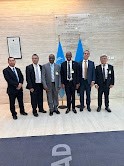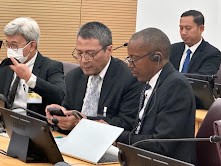Dr. Turad Senesie, the Minister of Lands, Housing, and Country Planning, delivered a compelling speech at the prestigious High-Level Session on Building a Global Land Agenda. This international event took place October 23, 2023 at the IFAD Headquarters in Rome, Italy. Dr. Senesie represented Africa with a call for increased collaboration and partnerships to enhance land tenure security and ensure equitable access to and control over land resources.
During his speech, Minister Senesie underscored the unwavering commitment of Sierra Leone’s Government, led by His Excellency, Dr. Julius Maada Bio, to address critical issues surrounding land reform. He highlighted the growing challenge of land access in Sierra Leone, brought about by the sale of land at exorbitant prices, leading to widespread individual land ownership for profit rather than productive use.
Dr. Senesie elaborated on the numerous challenges plaguing Sierra Leone’s land sector, which include outdated and conflicting policies, weak deed registration systems, inadequate land records management, and limited institutional and technical capacity. Scarce funding in Africa has made Government entities heavily reliant on donor support, which may not always align with national policy objectives. Additionally, the absence of complete and reliable data sets has hindered effective land management and administration.
In response to these challenges, Sierra Leone has implemented a series of measures as part of its land reform process. The enactment of the Customary Land Rights Act in 2022 aims to eliminate discrimination and provide equal land access for all, including the Creole tribe, who were previously excluded from acquiring land in the provinces. The Act also grants women the right to inherit family land and access land without marriage as a prerequisite.
Minister Senesie emphasized the significance of mapping, recording, and registering land titles to enhance tenure security, especially for customary land rights in the provinces. Sierra Leone has also established the National Land Commission to effectively implement the National Land Policy and the Customary Land Rights Act.
The success drivers behind Sierra Leone’s land reform process were identified as strong political will, the creation of a multi-stakeholder platform involving Government bodies, traditional leaders, civil society organizations, development partners, and the private sector, along with effective funding mobilization.
Minister Senesie expressed gratitude to international development partners, including the UNDP, FAO, and the World Bank, for their financial support and urged others to provide essential assistance to sustain the land reform process. He stressed the importance of mobilizing funds for land mapping, surveys, and cadastral index mapping to ensure global support for land tenure security, access to land, and sustainable development.
In conclusion, the Minister reaffirmed the Government of Sierra Leone’s commitment to prioritizing land reform as a cornerstone for sustainable development, prosperity, and the well-being of its citizens.
The High-Level Session on Building a Global Land Agenda featured presentations from other continents, with Indonesia representing Asia, Colombia representing America, and France representing Europe. The event aimed to encourage greater collaboration and concerted efforts to strengthen land tenure and resource management worldwide.
Minister Senesie was accompanied by Dr. Alphajoh Cham, the Director of Policy and Planning in the Ministry of Lands, Housing, and Country Planning.








LANDS MINISTER IN LAND GRABBING SCAM – https://salonecompassnewspaper.com/index.php/2023/07/25/lands-minister-in-land-grabbing-scam/?fbclid=IwAR2dxS7SehvbsP9UshqfnV3k9hKVpQ6Ifpod8UtQDUz5YsNRGCxk08VJZGw